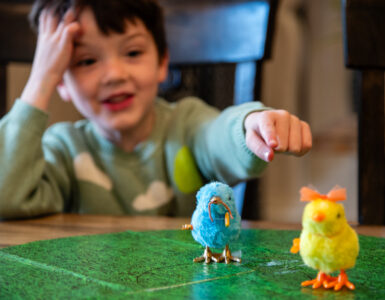Every parent wants their child to have a magical Christmas experience, and be a perfect angel!
Family engineer Heather Johnson says that’s a tall order.
Think about it, they are bombarded with advertisements for new toys and games and “stuff”. We tell them to write a wish list, and send it to Santa who can make and deliver anything. We give them lots of treats, there are lots of visitors and they don’t get enough sleep, and THEN we want them to act like perfect angels.
Yep, there could be some meltdowns. But,there doesn’t have to be. Selfishness is possible at every age. research shows that children under 2 actually fell more happiness from giving their toy or food to someone else, than eating it themselves. If we work with our kids each day to express gratitude and to provide them with opportunities to serve others, they will be more selfless, and if we are good examples, they will follow in our footsteps at all ages.
A few things to consider.
1. WE need to have realistic expectations.
We all have a vision of how we want the holidays to go. When they don’t go as planned, when kids are ungrateful or not as excited about their gifts as we had hoped, or when they “get the gimmies”, we get upset and stressed and less patient. Just because it is Christmas, doesn’t mean our children will all of a sudden be perfect. We need to keep a clear perspective and be flexible. Don’t let your expectations for the holiday become more important than your children.
Also, understand that kids are going to ask for more toys and treats and more of everything. Take the shock value out of the requests because you know they are going to happen.
· Make your expectations clear,
· Make consequences clear ahead of time (when you are shopping, and in preparing for the arrival of Santa)
· Instead of always saying “no”, try to turn all the “no’s” into “yes”. For example: I make sugar cookies every Christmas. Without fail our daughter is always asking for more and more and more. Instead of “no, you already had two cookies”, I turn the no to a yes. “You can have some raisins or some cheese and crackers.” This also gives them choices, which makes them feel in control, and makes them more likely to obey with a good attitude.
2. We also need to see things from their point of view. Think back to when you were a child. There is so much excitement and anticipation. You waited all year for the holidays. Kids don’t understand the ins and out of Santa and Christmas. All they know is that they are excited. See the world through their eyes and let them be excited. It will be much easier to be patient with themeltdowns if we look at things from their point of view.
3. Stick to your schedule.
Stay consistent with meal times, nap times and bed times. This is THE BEST WAY TO AVOID MELTDOWNS THIS CHRISTMAS. Getting behind on sleep is a recipe for disaster.
4. Talk to your children about what Christmas is really all about. This needs to happen all year long. Instead of Christmas focusing on getting things, let Christmas focus on giving to others so your children care more about helping, then receiving. This is something we need to work on all year long. Encourage gratitude every day.
If your kids are acting up before Christmas:
DON’T THREATEN.
Don’t say things like “if you don’t stop, Santa isn’t going to come.” Or, “if you don’t stop, I am going to take all your presents out from under the tree.” Although this may get us the behavior modification short term, it will hurt us in the long run. Plus, these are very hard consequences to enforce, which means we loose credibility with our children and they know we won’t follow through so they will act out again.
DON’T DISMISS BAD BEHAVIOR
If they do throw a fit on Christmas morning because they didn’t get what they want, talk to them. Don’t say things like “You’re acting like a baby”, or “It’s not a big deal.” Also, telling them that kids in other countries would give anything for a gift like yours”, will not work either. (Unless they have actually seen what it is like for these others kids, they don’t understand)
HELP THEM DEAL WITH DISAPPOINTMENTS
Not getting everything on their list, or exactly what they want is okay. We don’t want to give our kids everything, or they won’t be grateful for anything. The feelings they have are disappointment. And disappointment is part of life. We need to help our children learn to deal with disappointment because they will face it again .
First, validate their feelings. “I know (or I can see) you are disappointed that Santa didn’t bring…”
Then, let them talk so you can get to the bottom of the disappointment. For example. One year our son didn’t get a football he had asked for. He was disappointed. After letting him talk about it, we found out he was disappointed because he had told his friends at school he was getting one and would bring it so they could play football at recess. He was upset because he didn’t know what they would say when he didn’t make good on his promise. Understanding more about the disappointment can help us know how to talk to them about it.
Then, talk about what can and cannot be changed ” Santa doesn’t always bring everything on our lists. We can’t change what he brought, but we can be grateful for what you did get and have a lot of fun playing with that.”
And…talk to them about all this BEFORE Christmas morning. Prepare them. Explain. Communicate with them. If Santa is really cutting back this year (for financial reasons, talk about it)
If there are temper tantrums over the situation, treat them like you would any other temper tantrum. Stay calm, don’t try to reason, and ignore the tantrum. Remove your child from the holiday excitement until they can calm down. Never withhold love.
Find and follow Heather’s parenting advice and practical tips for rich family living at:















Add comment